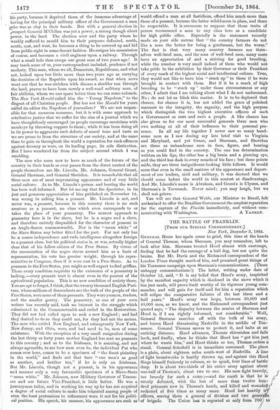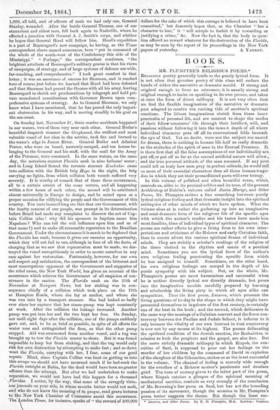THE BATTLE OF FRANKLIN.
[FROM OUR SPECIAL CORRESPONDENT.]
New York, December 3, 1864. GENERAL HOOD has again come to grief, this time at the hands of General Thomas, whom Sherman, you may remember, left to look after him. Sherman treated Hood almost with contempt, finding that he had the courage of a bull dog, but not quite the brains. But Mr. Davis and the Richmond correspondent of the London Times thought much of him, and promised great things of his Tennessee campaign upon Sherman's communications. (Those unhappy communications !) The latter, writing under date of October 12, said, "It is my belief that Hood's army, inspirited by the manifest sagacity which is disclosed in the move which it has just made, will prove itself worthy of its vigorous young com- mander, and will gain for itself and for him a reputation which will eclipse the comparative failures of the last three and a half years." Hood's army was large, between 30,000 and 40,000 men, as we know, and the Richmond correspondent just quoted says, "The disparity between the armies of Sherman and Hood is, if I am rightly informed, not considerable." Well, General Sherman marches off with the bulk of his army, and leaves Hood threatening Nashville in the middle of Ten- nessee. General Thomas moves to protect it, and halts at an enticing distance. Hood advances, Thomas skirmishes and falls back, and finally, when he thinks that Hood has "got him just where he wants him," and Hood thinks so too, Thomas orders a stand. General Schofield is in immediate command. The place is a plain, about eighteen miles south-west of Nashville. A line of light breastworks is hastily thrown up, and against this Hood flings himself furiously in column, so to speak, four lines of battle deep. It is about two-thirds of his entire army against about one-half of Thomas's, about two to one. His men fight bravely, too bravely for such a cause ;—and the result is that he is utterly defeated, with the loss of more than twelve hun- dred prisoners now in Thomas's hands, and killed and wounded% reckoned at five times as many more. Hood lost heavily i officers, among them a general of division and two genei, of brigade. The Union loss is reported at only from 700:1 to
1,000, all told, and of officers of rank we had only one, General Stanley, wounded. After the battle General Thomas, one of our staunchest and ablest men, fell back again to Nashville, where he effected a junction with General A. J. Smith's corps, and whither he hopes that General Hood will follow him. Hood's expedition is a part of Be,auregard's new campaign, he having, as the Times correspondent above named announces, been "put in command of the whole of the south-west of the Confederacy this side of the Mississippi." " Perhaps," the correspondent continues, "the brightest attribute of Beauregard's military genius is that his views of campaigns, of strategy, and of large systems of defence are wide, far-reaching, and comprehensive." I took great comfort in that letter ; it was an assurance of success for Sherman, and it reached here of course just before we learned that Hood had been defeated and that Sherman bad passed the Oconee with all his army, leaving Beauregard to Ishriek out proclamations by telegraph and hold pri- vate unmolested consultations with Governor Brown upon com- prehensive systems of strategy. As to General Sherman, we only know what I have mentioned, that he has passed the only import- ant obstruction in his way, and is moving steadily to his goal on the sea-coast.
On Sunday last, November 27, three marine accidents happened in our waters, two of them very near each other. General Butler's beautiful dtspatch steamer the Greyhound, the swiftest and most valuable vessel of her class in the service, took fire and burned to the water's edge in James River. General Butler and Admiral Porter, who were on board, narrowly escaped, and ten horses be- longing to the General and his staff, with the mail for the Army of the Potomac, were consumed. In the same waters, on the same day, the notorious steamer Florida sank in nine fathoms' water ; and in Long Island Sound the revenue steamer. Kankakee came into collision with the British brig Hope in the night, the brig carrying no lights, from which collision both vessels suffered very severely. It is worthy of remark that of these three occurrences, all to a certain extent of the same nature, and all happening within a few hours of each other, the second will be attributed ahnost universally in Europe to design, and be seized upon as a proper occasion for vilifying the people and the Government of this conntry. You have learned long ere this that our Government, with the heatty consent of our people, was prompt in its determination before Brazil had made any complaint to disavow the act of Cap- tain Collins (alas I why did his sponsors in baptism name him Napoleon ? Who can tell the evil influence upon him and us of that name ?) and to make all reasonable reparation to the Brazilian Government. Under the circumstances it is much to be deplored that the Florida has sunk, because it gives our enemies an opportunity, which they will not fail to use, although in face of all the facts, of charging that as we saw that repararation must be made, we des- troyed the vessel surreptitiously in order to secure ourselves in any case against her restoration. Fortunately, however, for our own self-respect and satisfaction, the correspondent of the bitterest and most unscrupulous opponent of the Government and supporter of the rebel cause, the New York World, has given an account of the occurrence which relieves the Government of all suspicion of con- nivance in the matter. The Florida sank on the 27th of November at Newport News, but her sinking was in con- sequence chiefly of a collision which took place on the 19th at Hampton Roads, where she lay at anchor, and where she was run into by a transport steamer. She had leaked so badly ever since her capture that her steam-pump was kept constantly at work. After the collision the leakage increased. Another pump was put into her and the two kept her free. On Sunday, not until eight days after the collision, one of the pumps suddenly gave out, and, to be as brief as possible, in spite of all efforts the water rose and extinguished the fires, so that the other pump stopped. Aid was summoned from another vessel, and a tug was brought up to tow the Florida nearer to shore. But it was found impossible to keep her from sinking, and that the tug would only risk her own destruction by attempting to mike fast ; and so down went the Florida, carrying with her, I fear, some of our good repute. Mind, since Captain Collins was bent On getting us into this scrape we should not have mourned much if he had sunk the Florida outright at Bahia, for the deed would have been no greater offence than the attempt. But after we had undertaken to make reparation, we would not have had this happen for a thousand Floridas. I notice, by the way, that some of the savagely virtu- (xis journals on your side, in whose mouths butter would not melt, and who do not know the meaning of in quo que, read grave lectures to the New York Chamber of Commerce anent this occurrence.
.I The' ndon Times, for instance, speaks of " the reward of 500,000 dollars for the sake of which this outrage is believed to have been committed," but demurely hopes that, as the Chamber "has a character to lose," it "will scruple to forfeit it by rewarding or justifying a crime," &c. Now the fact is, that the body in ques- tion offered no reward whatever for the destruction of the Florida, as may be seen by the report of its proceedings in the New York































 Previous page
Previous page